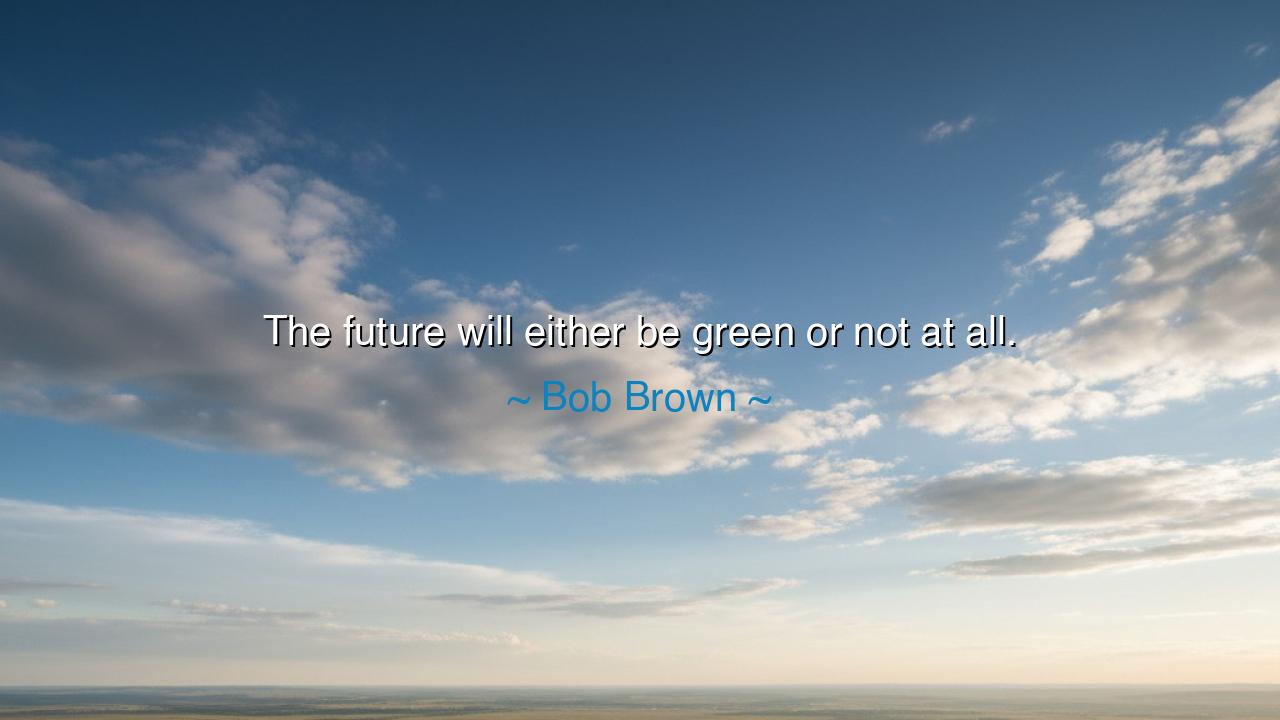
The future will either be green or not at all.






"The future will either be green or not at all." These words spoken by Bob Brown carry with them a prophetic urgency, urging humanity to make a choice—a choice between sustainability and destruction. Brown’s statement is not merely a reflection on environmental concerns, but a call to action, a stark reminder that the path we choose in the coming years will determine the survival of our planet and its ecosystems. In these words, we see the weight of responsibility placed on our shoulders. The future, he warns, depends on the health of the earth, and if we fail to protect it, we may face a future where there is no planet left to sustain us.
The ancients, too, understood the deep connection between humanity and the natural world. The Greeks spoke of the earth as a living organism, a mother who provided sustenance to all her children. In their mythology, Gaia, the Earth goddess, was revered as the source of life, the one who gave everything its form and purpose. The Greeks understood that their very existence depended on their relationship with nature—if they honored the earth, they would prosper, but if they disrespected her, there would be consequences. The lesson is clear: the health of the earth is inseparable from the health of humanity. To neglect nature is to risk the collapse of our very civilization.
In the same way, Bob Brown’s quote speaks to the balance that must be struck between human progress and environmental preservation. The future, Brown tells us, will be shaped by our actions today. Climate change, deforestation, and pollution have already caused irreparable damage to ecosystems around the world. Yet, there is still time to change course—if we act swiftly and decisively. The idea that the future will either be “green” or “not at all” encapsulates the urgency of this moment. We stand at a precipice, with the power to either heal the earth or push it beyond recovery. The future of humanity, Brown suggests, hinges on the choices we make regarding sustainability and the stewardship of our natural resources.
The story of Mahatma Gandhi, a man who understood the interconnectedness of all life, offers a powerful example of what it means to live in harmony with nature. Gandhi believed that true progress was not measured by the accumulation of wealth or material goods but by the health of the land and the well-being of the people. In his efforts to promote non-violent resistance and self-sufficiency, he advocated for simple living and the protection of the environment. His work in promoting sustainable farming and the importance of renewable resources was revolutionary for its time. Like Brown, Gandhi recognized that the health of the planet was inextricably linked to the survival of society. If we damage the earth, we damage ourselves.
Yet, despite the wisdom of Gandhi and others throughout history, humanity has continued to exploit the earth’s resources at an alarming rate. The ancient Romans, too, experienced a rise and fall of their empire in part due to their environmental mismanagement. Deforestation, soil degradation, and overconsumption of resources contributed to the weakening of the Roman Empire. Their story serves as a cautionary tale: societies that fail to respect the limits of nature inevitably face collapse. The environmental challenges we face today—such as rising sea levels, loss of biodiversity, and the depletion of natural resources—are symptoms of a much larger issue: disconnection from the earth.
The lesson of Brown’s words, then, is one of deep reflection. We must ask ourselves: what kind of future do we want to leave behind? The choices we make today—about how we consume, how we protect, and how we respect the natural world—will shape the world of tomorrow. Sustainability is not merely a buzzword; it is a necessity for our survival. To create a green future means taking steps now—reducing waste, embracing renewable energy, protecting natural habitats, and fostering a deep sense of environmental responsibility in every action we take.
In practical terms, this means educating ourselves and others about the urgent need for environmental protection. It means supporting policies that promote sustainable development, green technologies, and conservation efforts. Each of us has a role to play in ensuring that the earth remains a place where life can thrive. Let us embrace the green future that Bob Brown speaks of, for in doing so, we ensure the continued existence of the very world that gives us life. Let us act with urgency and wisdom, for the future is not a distant dream—it is being shaped by our choices today.






AAdministratorAdministrator
Welcome, honored guests. Please leave a comment, we will respond soon